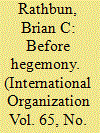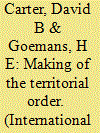|
|
|
Sort Order |
|
|
|
Items / Page
|
|
|
|
|
|
|
| Srl | Item |
| 1 |
ID:
103889


|
|
|
|
|
| Publication |
2011.
|
| Summary/Abstract |
Rationalist accounts of international cooperation maintain that states create international institutions to solve problems of distrust. They rest on a particular notion of trust, a strategic variety in which states trust based on information about others' interests. I seek to overturn this conventional wisdom. Drawing on social psychology, I point to the importance of generalized trust, an ideological belief about the trustworthiness of others in general. Generalized trust precedes institution-building and serves as a form of anarchical social capital, facilitating diffuse reciprocity and allowing state leaders to commit to multilateralism even in cases that rationalists deem inhospitable to cooperation and without the institutional protections that rationalists expect. In case studies of U.S. policy on the creation of the League of Nations and the United Nations, I demonstrate that generalized trust is necessary for explaining the origins of American multilateralism and the design of these organizations.
|
|
|
|
|
|
|
|
|
|
|
|
|
|
|
|
| 2 |
ID:
103892


|
|
|
|
|
| Publication |
2011.
|
| Summary/Abstract |
What effect does repeated play have on reputation building? The literature on international relations remains divided on whether, when, and how reputation matters in both interstate and intrastate conflict. We examine reputation building through a series of incentivized laboratory experiments. Using comparative statics from a repeated entry-deterrence game, we isolate how incentives for reputation building should change as the number of entrants changes. We find that subjects in our experiments generally build reputations and that those investments pay off, but we also find that some subjects did not react to incentives to build reputation in ways our model had predicted. In order to explain this, we focus on the heterogeneity of preferences and cognitive abilities that may exist in any population. Our research suggests that rational-choice scholars of international relations and those using more psychologically based explanations have more common ground than previously articulated.
|
|
|
|
|
|
|
|
|
|
|
|
|
|
|
|
| 3 |
ID:
103890


|
|
|
|
|
| Publication |
2011.
|
| Summary/Abstract |
We argue that new international borders are rarely new. We propose that when states choose new borders they use previous administrative frontiers to solve a difficult short-term bargaining problem and a long-term coordination problem. With a unique new set of data collected specifically for this project, we systematically examine the new international borders of the twentieth century resulting from secession, partition, and the use of force. New international borders, we find, are drawn not according to principles of "nationalism" or defensible borders, but rather according to previous administrative frontiers. How borders are drawn has important consequences for international stability: borders drawn along previously existing internal or external administrative frontiers experience fewer future territorial disputes and have a much lower risk of militarized confrontation if a dispute emerges.
|
|
|
|
|
|
|
|
|
|
|
|
|
|
|
|
| 4 |
ID:
103891


|
|
|
|
|
| Publication |
2011.
|
| Summary/Abstract |
International political economy (IPE) should transition to "third-wave" scholarship because Open Economy Politics (OEP), which dominates current American IPE scholarship, can generate inaccurate knowledge. OEP can produce inaccurate knowledge because it studies domestic politics in isolation from international or macro processes. This methodological reductionism is often inappropriate for the phenomena IPE studies because governments inhabit a complex social system. As a result, the political choices that OEP strives to explain are typically a product of the interplay between domestic politics and macro processes. When OEP omits causally significant macro processes from empirical models, the models yield biased inferences about the domestic political relationships under investigation. Although scholars tolerated such errors when the gains from OEP were large, these errors are less tolerable now that OEP has matured. Consequently, the field should transition toward research that is nonreductionist, problem-driven, and pluralistic.
|
|
|
|
|
|
|
|
|
|
|
|
|
|
|
|
| 5 |
ID:
103888


|
|
|
|
|
| Publication |
2011.
|
| Summary/Abstract |
We live today in the world's first universal, multicultural, and multiregional system of sovereign states. Five centuries ago, emergent sovereign states were confined to Europe and contained within the bounds of Latin Christendom. Through five great waves of expansion this nascent European system globalized. The Westphalian settlement, the independence of Latin America, the Versailles settlement, post-1945 decolonization, and the collapse of the Soviet Union each brought a host of new states into the system. How can we explain these great waves of expansion, each of which saw imperial systems of rule displaced by the now universal form of the sovereign state? After detailing the limits of existing explanations, this article presents a new account of the principal waves of systemic expansion that stresses the importance of subject peoples' struggles for the recognition of individual rights. Empires are hierarchies, the legitimacy of which has been sustained historically by traditional regimes of unequal entitlements-institutional frameworks that allocate individuals of different social status different social powers and entitlements. In the Westphalian, Latin American, and post-1945 waves of expansion, which together produced most of today's sovereign states and gave the system its principal regions, subject peoples embraced local interpretations of new, distinctly modern ideas about individual rights and challenged the traditional distribution of entitlements that undergirded imperial hierarchy. Each wave differed, not the least because different rights were at work: liberty of religious conscience, the right to equal political representation, and after 1945, a compendium of civil and political rights. But in each case a "tipping point" was reached when the imperial system in question proved incapable of accommodating the new rights claims and subject peoples turned from "voice" to "exit," and each time the sovereign state was seen as the institutional alternative to empire.
|
|
|
|
|
|
|
|
|
|
|
|
|
|
|
|
|
|
|
|
|